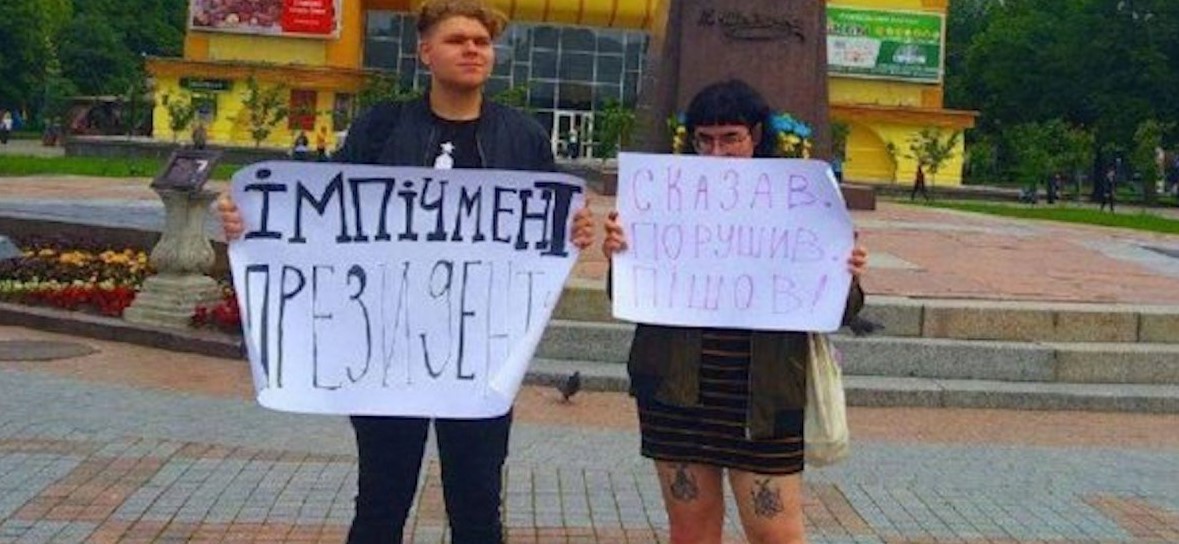Court quashes Ukrainian schoolgirl’s conviction for picket demanding Zelensky’s impeachment

While cheering that the Rivne Court of Appeal has agreed that 16-year-old Darya Kotsyuruba did not infringe the law by standing on Rivne’s Independence Square with a placard calling for the impeachment of Ukrainian President Volodymyr Zelensky, it is disturbing that this absurd ‘case’ should have reached appeal level. It was already bad enough that over-zealous police officers had detained Darya and her 20-year-old friend, Roman Filiuk, for standing in the middle of the square with four placards, one demanding Zelensky’s impeachment, but then a first level court got involved and convicted the two young people.
The two young people were detained on 25 May 2019 while holding a two-person picket in the centre of the square. This was just days after Zelensky’s inauguration, and the picket was prompted by anger over the President’s first appointments. A passer-by seemingly objected to the messages on the placards, and presumably complained to a police officer. The latter turned up and, having ascertained that the two young people had not given prior notification of this ‘meeting’, took them away to the police station.
It is true that Ukraine’s Constitution (Article 39), while very clearly guaranteeing freedom of peaceful assembly, does say “upon notifying in advance the bodies of executive power or bodies of local self-government.”
The demand for prior notification makes a lot of sense when a procession along main streets is planned, or a demonstration with hundreds or thousands involved. It makes none when two very young people, who doubtless had no idea whom they should notify, came out for an extremely modest picket.
Ukraine is not Russia, and the police spokesperson’s claim that the kids had been holding “an unauthorized meeting” was both chillingly similar to Russian excuses for repressive measures, and wrong. You do not need to ask for ‘authorization’ in Ukraine, you merely need to inform the authorities of your plans.
The police later claimed that the young people had merely been ‘invited’ to the police station. Had they been asked whether they wanted to go to the police station, or not, they would certainly have refused, so the term ‘invitation’ is difficult to take seriously.
Darya did, however, ask if the officer was going to draw up a protocol of an administrative offence, and was told no, although this later proved to be false.
The two waited for around two hours at the station, before Hanna Palamarchuk appeared and told Darya to come with her upstairs to give testimony. There seems to have been an altercation at that point, although the young girl was quite right that, as a minor, she could not be questioned without her mother. The latter was eventually called in.
Protocols were drawn up under Article 185-1 of the Code of Administrative Offences which punishes for something called ‘Infringements of procedure for organizing and holding gatherings, protests, street processions and demonstrations’. The alleged offence in the two young people’s case was their failure to notify the authorities. Even more absurd was the fact that Nataliya Kotsyuruba was also handed an administrative protocol under Article 184 for supposedly ‘not properly carrying out duties regarding the upbringing of children’.
Despite civic protest, and intervention from Zelensky, the protocols were not, unfortunately, just quietly discarded. Instead, on 26 June, the Rivne City Court found 16-year-old Darya Kotsyuruba and her friend guilty of the above-mentioned administrative offence. She was only issued with a warning, without any fine, but she and Filyuk rightly appealed against that ruling.
On 2 August, Judge Stepan Shymkiv, from the Rivne Court of Appeal, dismissed the earlier ruling.





